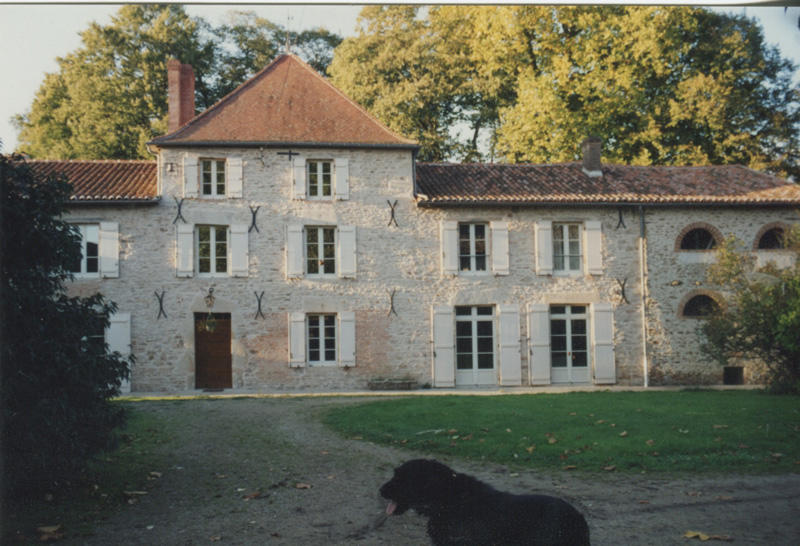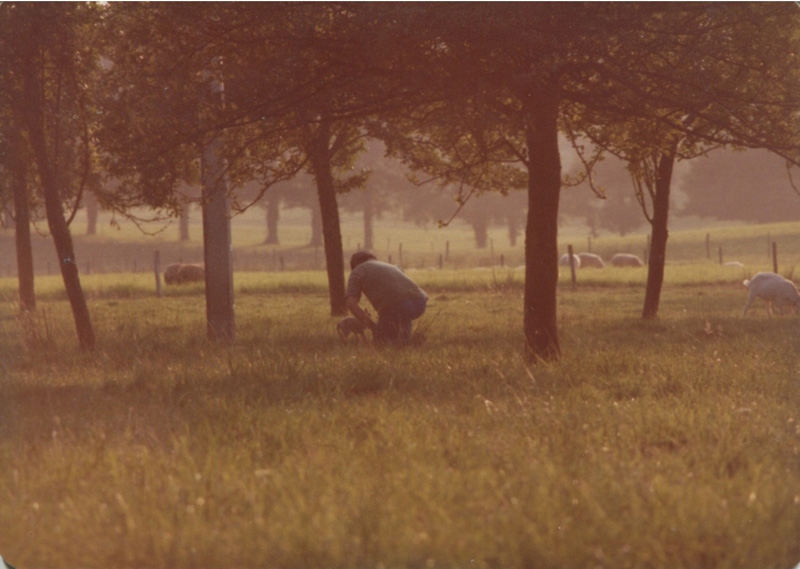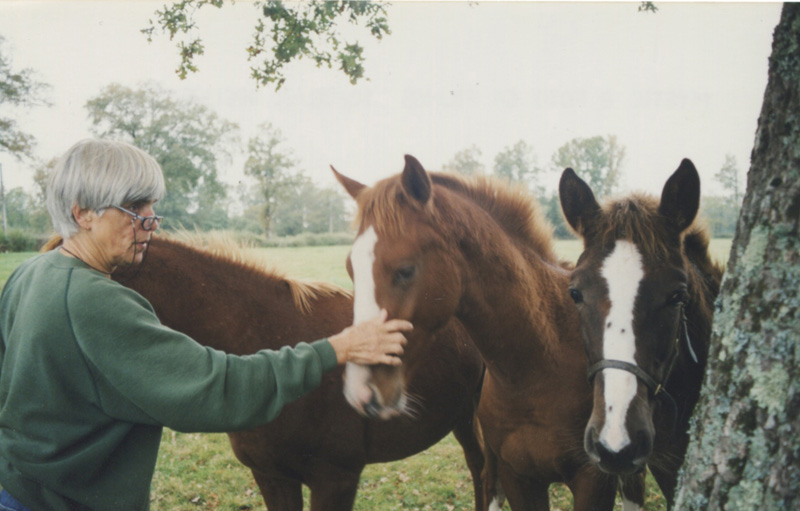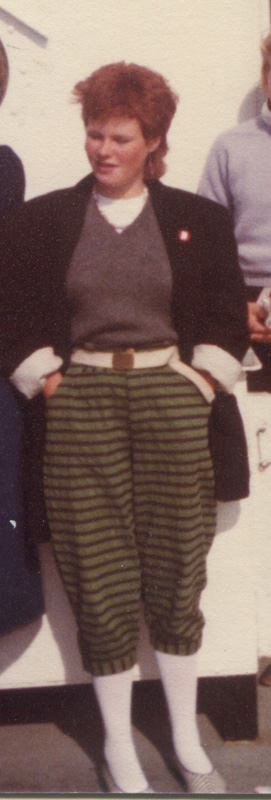When I was sixteen I decided it was time for me to go to Europe. Nancy Safford, a girlfriend of my father’s from a decade before, told me about her time in France, photographing farmers in the Limousin region of France. She spent a lot of time on a farm in a village called Roussac working in exchange for room and board. I had spent a great deal of my childhood on farms; we had chickens, a goat, a horse, and a steer at various times. I loved farms, I loved animals. Nancy gave me the address of the woman, Miranda, who owned the farm. She was an American, from Michigan, and operated a large sheep farm in central France near Limoges. I was told she also raised horses; I thought maybe I could ride too.
I mailed off a postcard, asking if I could come to her farm the next summer and work for room and board.
A few months later I received a postcard with the most incredible handwriting I had ever seen. Miranda had said yes, I could come and work on the farm, though I would not be able to ride the horses. They were at a separate barn, and being trained for show jumping.
It was my junior year of high school and in the fall of 1980 and the spring of 1981, I worked after school and weekends at Humphry’s Bakeshop to save money for my trip that summer.
June came and school was out and I was off on an adventure that would forever change my life. I borrowed a big brown suitcase from my grandmother, grabbed a backpack and a blank journal and my one semester of French and hopped on Air New England to Logan airport in Boston. I boarded a TWA jet by myself and headed to Paris. I had handwritten instructions from Miranda on how to get from Charles de Gaulle airport in Paris to the Limoges train station where I would be picked up.

After landing in Paris I was to take a bus to Porte Maillot, then a taxi to the train station Gare d’ Austerlitz, then once there, buy a ticket to Limoges. Miranda instructed: Punch the ticket in the black box! Board the 12:35 train which arrives in Limoges at 4:33 pm. Once arrived, go outside the train station, look for a silver Volkswagen Rabbit with license plate 597-0789.
I remember this vividly, and still wonder how I did all this in a day with no computers or cell phones and barely speaking any French. I am not sure why I wasn’t terrified, but I guess that is the gift of being young — you don’t think things through.
Once onboard the train to Limoges I was finally able to rest, drifting in and out of sleep. I remember waking, catching someone’s eye watching me. I probably stuck out like an obvious American. Once I arrived I headed outside and saw nothing but silver cars everywhere. I had my first fearful moment, then I finally spotted the right license plate. A tall blond woman in her twenties approached me as I headed towards the car.
”Tina.”
“Yes!,” I said with relief.
“Hi, I am Betsy. You should have said you had red hair!” she said. It was clear she was American.
I climbed in the car and relaxed. I had made it. Betsy explained that Miranda was away on vacation and would return soon.
On the way to the farm, we picked up Miranda’s horse trainer, Georges. He was a slight man with dark brown hair, friendly eyes, and classic chiseled cheekbones. He wanted to stop and buy some cherries, and we shared them on the car ride to the village of Roussac. We dropped Georges off at his small farm where he trained Miranda’s Angelo Arabian horses.
Miranda, whose full name was Comtesse Miranda de Toulouse Lautrec, had grown up in Michigan and was a graduate of Harvard University. After she was widowed, she and her young daughter traveled the world, eventually settling in France. Miranda eventually remarried a Frenchman who was a descendant of the famous painter Henri de Toulouse Lautrec. Miranda and her husband, who was called CC, had a gorgeous home in Versailles with her daughter, and now a son, Alex. In 1970 Miranda bought her farm, l’Essart. It was about 330 acres with a grand, but slightly tired and rundown-looking farmhouse. There was a smaller house where the shepherd Marcel and his family lived, as well as a sheep barn, and several other barns and buildings around the vast property. The countryside went on forever, filled with lush green fields and tall majestic trees, pretty much what you would fantasize a French country farm to be, but even prettier.
We pulled the car up to the front entrance and three women greeted us, all American — Laurie and Sue, who were traveling together, and Amey. Laurie was a friend of Miranda’s and left in charge.
I was shown my room, a small dark room on the second floor. In my journal I wrote, “It looks like I pay $10.00 dollars a week, but it will do.” We had a quick bite — fresh baguette and butter, yogurt, and chocolate, not a real dinner, but certainly a taste of France It was 6:30 pm and we headed out to join the farmers in the field to finish the day’s haying.
Haying fields or haymaking has a sense of urgency and is a combination of science and years of know-how about exactly when to cut, cure, and bail. The grass has to be just right so nutrients are intact. Young grass has more nutrients but has less yield. You need great weather — no rain. Once the grass is cut, it needs to be cured or wilted in the field, then bailed and loaded that day into the barn. As I kid, I remember haying season as a fun, festive but at times a brutally long, hot, sweaty, scratchy day.

On the field I was introduced, Bonjour, to the farmers. My guess is once they saw the small five-foot frame they decided I wasn’t strong enough to hay. After my long trip, I wasn’t in any condition to try and prove them wrong. Instead, I pretended I knew how to drive the tractor pulling the hay cart.
In late June the sun sets at almost 10 pm in the Limousin. A huge moon came up, lighting up the early summer sky. The hay was off the field and loaded “square as a sugar cube” on the large hay cart, secure for the night.
Over the next week or so, I worked on the farm, wrote postcards and letters home, and got to know my housemates, all in their early twenties. I took walks in the evening; the countryside was intoxicating. Even though the ladies were very kind, I missed my friends; I felt a lot younger than the others.
There were two dogs in the farmhouse and what seemed like way too many barn cats. They were everywhere — on the table, on the counter, in my room. The farmhouse was like an extension of a barn, rustic and kind of dirty. I remember being told Miranda didn’t want it to be nice; it was a working farm, not a retreat. If you were there, you were there to work and move on.
By early July, Miranda arrived on the farm and Betsy left. Miranda was a force, full of energy, strong, and funny. That day she arrived, we worked all day, finishing another round of hay at 10 pm, and then we shelled peas until midnight, sitting around the table, laughing and talking.
Pea season was one of Miranda’s focuses — picking, then shelling peas, then blanching, and freezing. If you were in the house, or in the car, really anywhere near Miranda, you were shelling peas.
I slowly got to know Miranda more, especially as we traveled several hours to horse shows on weekends, shelling peas in the car and watching Georges show the young beautiful horses they had bred, raised, and trained. We packed picnics with farm-cured ham that hung in the kitchen, hardboiled eggs, mayonnaise, cheese, bread, fruit, chocolate, and Panache a low-alcohol beer and lemonade. I began packing the picnics for the shows which I enjoyed and felt successful at.
I also started making fresh pea soup with an immersion blender, the first time I had ever seen one of those. I really began to understand and appreciate the food in France. We ate what was available on the farm: pork sausage from the freezer, fresh vegetables, eggs, jams made from currents on the farm, and more. Daily exceptions were bread, chocolate, butter, and cheese, occasionally croissants, all of which was a necessity from the outside world. By outside world, I mean the village of Roussac which resembled West Tisbury in its commercialism and density.
We harvested huge beets to store in a root cellar for cow feed. We got a warm bowl of milk every morning from Marcel or his wife, Annie, from which we made hot chocolate and fed the rest to the cats. The French don’t drink milk like Americans.
Miranda’s daughter Laurie would come and go from the farm. She was very kind and patient, and great at explaining who everyone was and how everything worked behind the scenes of l’Essart. I could ask her anything and I didn’t feel dumb.
A new traveler came to the farm, Lars from Sweden; he would be around for a few weeks. There were always lots of comings and goings.
On July 9th, after I’d been there for only eighteen days, Georges asked me to ride and train the three-year-old horses with him at his farm down the road. This was unexpected; Miranda had said I would never ride. I was quietly thrilled.
From my journal: “I hope so much that I do well and don’t F-up. Please let me do well!”

Riding went great, and I was invited to continue meeting him in the early misty mornings for training. The three-year-olds all had names beginning with the letter M, the two-year-olds would be the letter N. I rode a horse named Mon Cafe au Lait, and others with charming names.
My 17th birthday came and I remember waking up feeling lonely until I realized my birthday was Bastille Day, a holiday I didn’t really understand the meaning of. That night we had a nice dinner at the farm; Miranda had a few small gifts for me and then we went into the village of Roussac for a fête. We danced and drank Champagne with locals of all ages. I danced with some French boys. The magic of drinking Champagne during French National Day in France was not lost on me. I knew this was special and I felt lucky to be there.
The next day Miranda, Laurie, and Amey left; I changed rooms and got a beautiful room with windows that opened to the courtyard. Lars and I were left to run our part of the farm with a list of to-do’s from Miranda. We were also instructed to help Marcel: It was sheep-shearing time.
There were about five hundred sheep at L’Essart and this was the true business of the farm and what Marcel, his wife Annie, their children Francis, Guy, Patrice, and Joselyne were in charge of. The random travelers like us lent a hand when we were there, but we were not a reliable source of labor. However, shearing five hundred sheep was all hands on deck, and Lars and I jumped in with Marcel and a sheep shearer who traveled from farm to farm during the season.
I was always small, but strong. I was able to capture the lambs, holding them bear-hug style, as they thrashed their thick, woolly lanolin-and-manure-covered bodies; then we carried them to the shearing station. Over and over again. These were also long days, but satisfying.
Lars and I did not always get along. We both worked, and yet there was an expectation that I would make dinner and clean up. He treated me like a little sister, which I didn’t like. I felt we were equals running this end of the farm. It was an interesting situation to be in at my age.
We worked through it, as we always had plenty to do.
On Miranda’s list was to paint the shutters on the front of the farmhouse. It was really important to match the pinky-beige color of the shutters and repaint the whole front of the house.

From my journal: “Today Lars and I painted the whole front of l’Essart, Poof! We painted until 10:30.”
Long summer days on the farm were always made better with my ongoing early morning training with Georges, with his quiet, calm method, gently pushing the young horse forward over their first fence with a rider on their back. This was heaven to me and kept me grounded and feeling purposeful.
There was always this assumption that we knew what we were doing with all of these farm duties. We never asked; we just figured it out.
Georges lived with his mother, Madame Caroly, who didn’t speak or understand a lick of English. We smiled and smiled at each other. Sometimes I would get invited in for lunch with Georges and his mother, scrambled eggs, the French way, soft, never browned, bread, potatoes, salad, cheese, fruit, coffee, cookies.
Before I knew it, my two months in France were coming to an end. I didn’t want to leave. All the loneliness for my friends had subsided weeks before as I had become fully immersed in life on the farm. I loved the constant hum — always having something to do in this stunningly beautiful place. I felt a comfortable calm with the farmers who I only understood by nods and gestures and a few words. I looked forward to outings to the village for fresh baguettes and pastries; I cooked simple meals with confidence, using food grown on the farm. I learned it was weird to go barefoot on the farm, maybe that was just in France. It was weird to eat corn — that was for animals. I learned that riding horses was the same in France as it was at home. I learned homesickness fades, and I appreciated my friends even more as they took the time to write me letters and postcards throughout the summer. I learned a good work ethic is a common language wherever you are. Farms have a timeless element that feels safe and rewarding: safe from abrupt change and rewarding in accomplishing daily tasks.
On July 29th we stopped riding and went into Georges’ house. It was the wedding day of Prince Charles and Lady Diana. Madame Caroly made apricot tart and we drank Champagne and watched the wedding live with the rest of the world.
This was a trip of a lifetime that framed my future in ways I never stop appreciating. Yes, it was the magic of France — the incredible food, the quality of life, and the ability to slow down. The French culture and sense of community, hard work, and appreciation for simple beauty — those things are important to me still. Miranda’s unapologetic spirit and gusto gave me the confidence I needed at seventeen, as a young person and a young woman.

